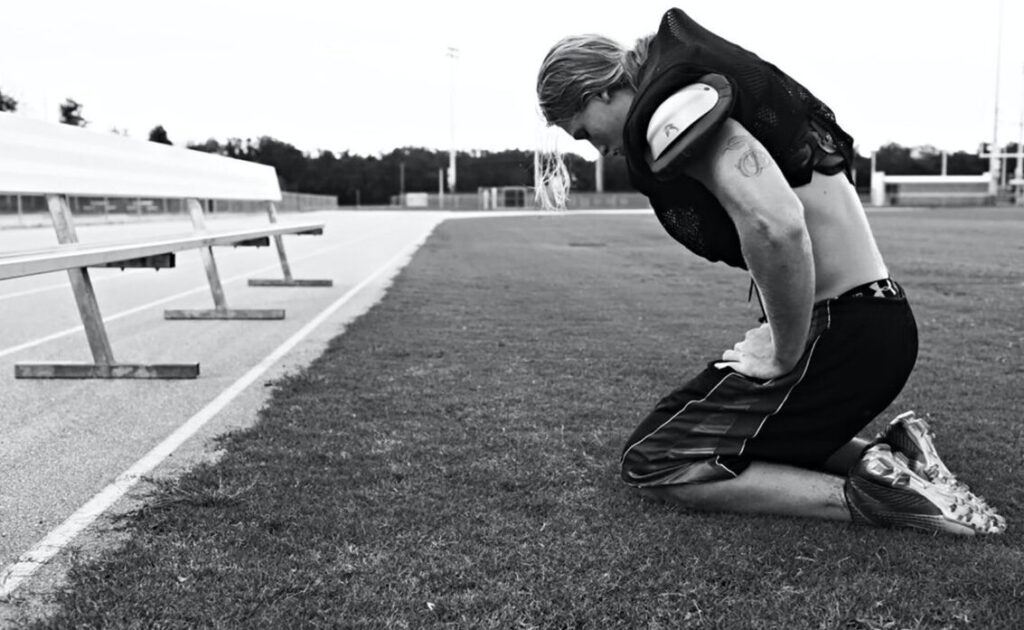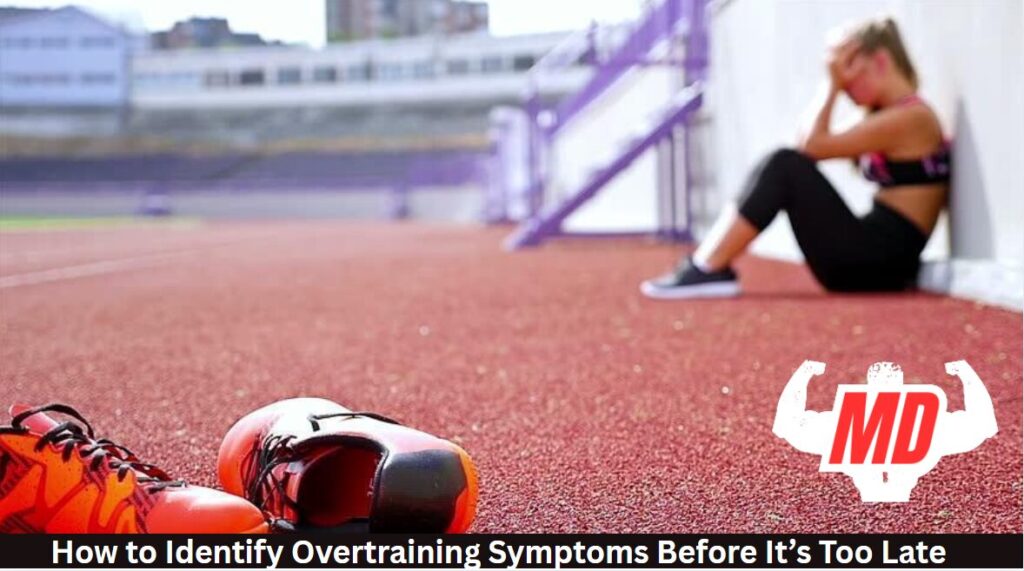You’ll know you’re overtraining when persistent fatigue won’t go away despite rest, your muscles stay sore beyond normal recovery, and you can’t lift weights you previously handled easily. Watch for mood swings, lost motivation, poor sleep, and getting sick frequently. If your resting heart rate jumps 5-10 beats higher than normal and workouts feel increasingly exhausting, you’re pushing too hard.
These warning signs reveal exactly when to pull back before serious damage occurs.
What Is Overtraining Syndrome
When you push your body beyond its ability to recover between workouts, you’re entering dangerous territory known as overtraining syndrome (OTS). This condition occurs when chronic stress from excessive training overwhelms your body’s recovery mechanisms, leading to systemic dysfunction.
Unlike overreaching, a temporary performance dip that resolves with rest, overtraining syndrome causes long-term physiological damage. You’ll experience persistent fatigue, hormonal imbalance affecting testosterone and cortisol levels, and central nervous system fatigue that impairs motor control and coordination.
The syndrome disrupts multiple body systems simultaneously. Your immune function declines, making you susceptible to illness. Insomnia becomes common despite exhaustion. Recovery between sessions becomes impossible, and performance steadily deteriorates regardless of effort. Without intervention, OTS can sideline you for months.

Early Physical Warning Signs
Before your body completely breaks down from overtraining, it’ll send you clear physical warning signals that demand immediate attention.
Persistent fatigue that doesn’t improve with rest is your first red flag. You’ll wake up exhausted despite adequate sleep, and low energy will plague you throughout the day.
Muscle soreness becomes your constant companion, lingering far beyond the typical 48-72 hours post-workout. Unlike normal delayed onset muscle soreness, this discomfort won’t fade between training sessions.
You’ll notice reduced strength in previously manageable lifts. Weights that once felt light suddenly seem impossibly heavy. Your power output drops, endurance tanks, and simple movements feel laborious. These aren’t just bad days. They’re your body screaming for recovery before serious damage occurs.
Psychological and Emotional Symptoms
Physical exhaustion is only half the battle. Your mind takes an equally devastating hit when you’re overtraining. You’ll notice mood swings becoming more frequent and intense, shifting from optimism to frustration without warning. That fire that once drove you to the gym? It’s replaced by a profound loss of motivation, making even your favorite workouts feel like punishment.
Irritability becomes your default state. Small annoyances trigger disproportionate reactions, straining relationships and work performance.
You’re not just being cranky. It’s psychological burnout manifesting through autonomic nervous system dysregulation. Your body’s stress response stays stuck in overdrive, disrupting emotional regulation.
Sleep becomes elusive despite exhaustion. You’ll toss and turn, mind racing with anxiety about tomorrow’s training or guilt about today’s poor performance.
Performance Red Flags
Despite pushing harder than ever, your performance metrics are moving backward. You’re experiencing performance decline across key indicators, such as slower times, reduced power output, and decreased endurance capacity. This adaptation failure signals that your body can’t handle the current training load.
You’ll notice workouts that once felt manageable now leave you exhausted. Recovery between sessions becomes increasingly difficult, with muscles staying tight and energy levels remaining depleted. Your body’s inflammation and immune response work overtime, making you susceptible to frequent colds, minor injuries, and nagging joint pain.
These aren’t temporary setbacks. When performance consistently drops despite increased effort, you’re witnessing classic overtraining symptoms. Unlike normal fatigue, this resembles chronic fatigue syndrome patterns. You’ll experience persistent exhaustion that rest doesn’t resolve. Your body’s fundamentally shutting down its adaptive mechanisms.

Biomarkers and Physiological Indicators
When your body’s struggling with overtraining, specific biomarkers reveal the internal damage before you feel the full effects. Your resting heart rate climbs 5-10 beats above normal, signaling stress on your cardiovascular system. An elevated heart rate during usual activities means you’re not recovering properly.
Blood tests show elevated cortisol levels, your body’s primary stress hormone, while testosterone drops considerably. This hormonal imbalance disrupts muscle repair and growth. Your immune system weakens, increasing inflammatory markers like C-reactive protein.
These physiological changes indicate you need immediate rest days and better recovery management. If your morning heart rate stays high for several days, it’s time to reassess your workout recovery protocols. Monitoring these biomarkers helps you catch overtraining before chronic fatigue sets in.
Causes of Overtraining
Why do athletes push themselves into overtraining territory when they know the risks? You’re often driven by the “more is better” mentality, believing extra sessions equal faster progress. It leads to excessive training volume or intensity without adequate recovery time.
You’ll experience overtraining symptoms when you consistently ignore your body’s need for rest. Poor sleep habits, inadequate nutrition, and dehydration compound the problem. External stressors like work pressure or relationship issues further drain your recovery capacity.
Without proper periodization, you’re constantly operating at high intensity. This chronic stress causes decreased strength and performance deterioration. You might skip rest days, fearing you’ll lose fitness, but this mindset backfires.

How to Prevent Overtraining
Preventing overtraining requires a proactive approach that starts with monitoring your training load. Track your workouts, including intensity, duration, and frequency. Use tools like heart rate variability monitors or simple training logs to spot patterns.
You’ll need to implement strategic rest days and deload weeks into your program. Schedule at least one full rest day weekly, and reduce training intensity by 40-50% every fourth week. This approach allows your body to adapt and recover.
Don’t underestimate nutrition and hydration in prevention. Consume adequate protein for muscle repair, carbohydrates for energy replenishment, and maintain proper hydration levels throughout the day.
When to Seek Professional Help
How long should you wait before admitting you need expert guidance? If your symptoms persist beyond 2-3 weeks despite rest, it’s time to consult professionals. Don’t let pride delay your recovery.
Start with your doctor for thorough blood wo,rk checking hormone levels, inflammatory markers, and nutritional deficiencies. They’ll rule out underlying conditions mimicking overtraining symptoms. Request tests for cortisol, testosterone, thyroid function, and vitamin D.
Next, work with a qualified coach or sports medicine specialist to restructure your training program. They’ll analyze your workout history, identify problematic patterns, and create a progressive recovery plan. Consider consulting a sports psychologist if mental symptoms dominate.
Recovery timelines vary, but professional intervention typically shortens them greatly. You’ll return stronger with proper guidance rather than stumbling through trial-and-error approaches alone.
Frequently Asked Questions
Can Overtraining Permanently Damage My Body or Athletic Performance?
Yes, you can permanently damage your body through severe overtraining. You’ll risk chronic injuries, hormonal imbalances, and cardiac issues. However, if you catch it early and recover properly, you’ll usually regain your full athletic potential.
Is Overtraining More Common in Certain Sports or Activities?
Yes, you’re more likely to see overtraining in endurance sports. High-volume activities without built-in rest periods, CrossFit, and sports with year-round competition schedules also carry elevated risk.
Can Supplements Help Prevent or Treat Overtraining Syndrome?
While certain supplements like magnesium, vitamin D, and omega-3s can support recovery, they won’t cure overtraining syndrome. You’ll need proper rest, reduced training load, and adequate nutrition. Don’t rely on supplements alone for treatment.
How Do Age and Gender Affect Overtraining Risk?
Your age and gender greatly influence overtraining risk. Women’s hormonal cycles affect recovery needs, while older athletes require lengthier rest periods. You’ll notice younger males often push harder, but post-menopausal women face unique recovery challenges.
Should I Completely Stop Training if I Overtrained?
Don’t stop completely unless you feel it. Instead, reduce intensity by 50-70% and focus on light activities like walking or swimming. You’ll maintain fitness while allowing your body to recover without losing all progress.



